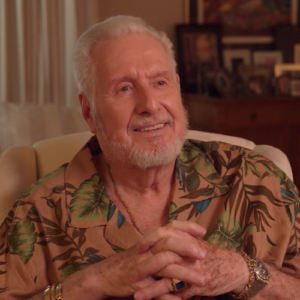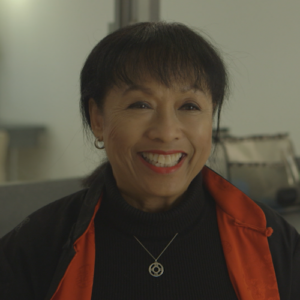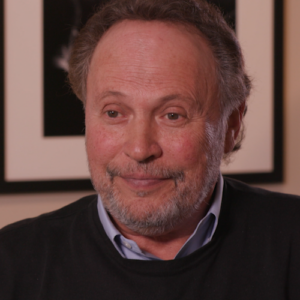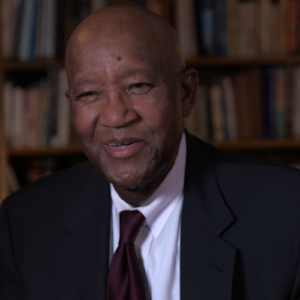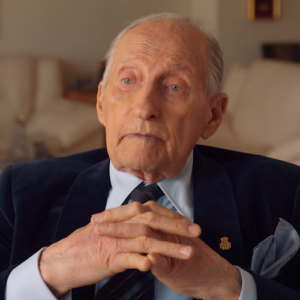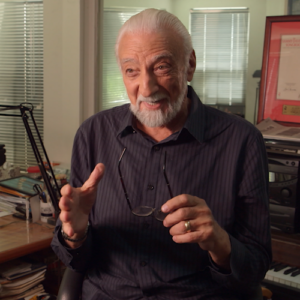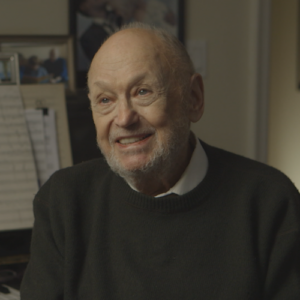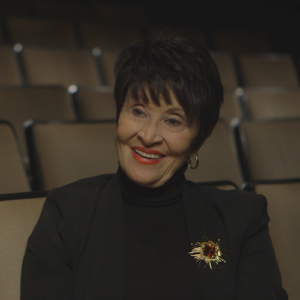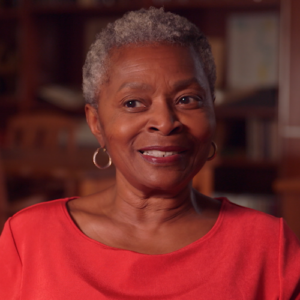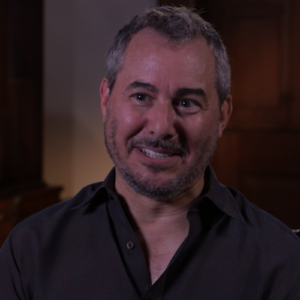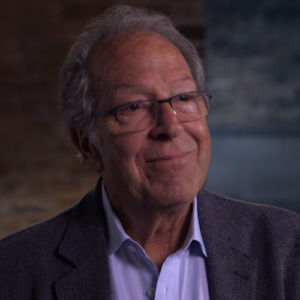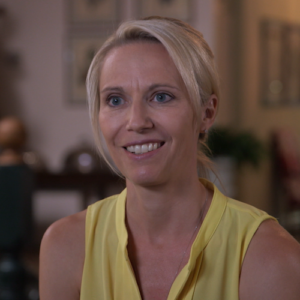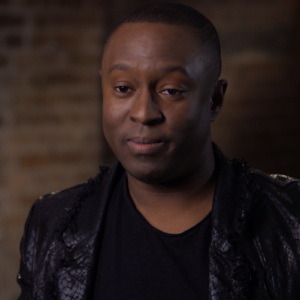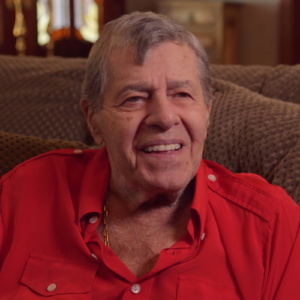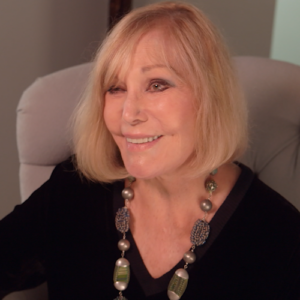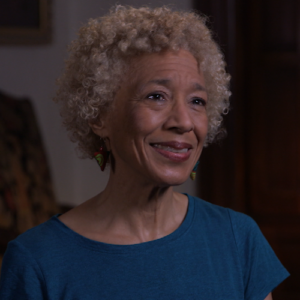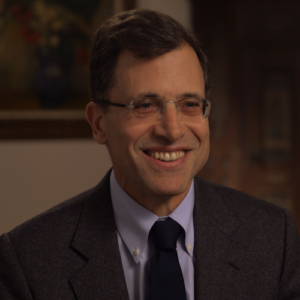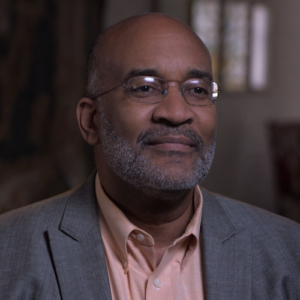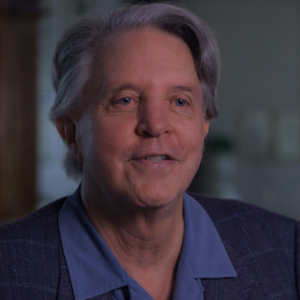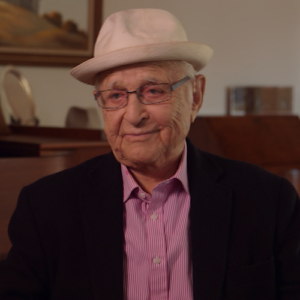Interviewer: So let’s just start by tell us who you are and what you’re here to talk about.
Steve Lawrence: My name is Steve Lawrence, and I was fortunate enough to be a very good old dear friend of Sammy Davis Jr, who I think was probably one of the most talented men ever to appear on any stage anywhere. And I’m delighted that American Masters finally got around to paying tribute to this man.
Interviewer: Just quick, who is Sammy Davis Jr?
Steve Lawrence: Well, if you didn’t know Sammy Davis Jr, then I don’t know what log you were living under or you have never seen a television show or a movie or a nightclub or something, because this man was probably one of the most exciting performers alive. And, you know, anybody who saw him was just there, could not believe that all this talent came flowing out of this one individual. You know, for a little guy, his talent was great.
Interviewer: Fantastic. Now, when did you first become aware of Sammy?
Steve Lawrence: Tuesday. I’ve known Sammy for 55 years. Easy, maybe. Plus. And I think the first time I met him, he was still with the Will Neston Trio. And then it became, well, best in Trio featuring Sammy Davis. And eventually it just became Sammy Davis Jr. And I knew Sam Senior when we first moved out to California. Sam’s senior used to fish every Sunday with my cleaner. The guy who cleaned that. We send our clothes to the cleaners and he said, You know, I go fishing with Sammy Davis. The father said, Sam, seen you? Yeah, I know. And because when they would catch anything, Sam Senior would come to my house and drop off some of the fresh catch and we put it in a freezer. So I always knew when he went fishing that if he didn’t catch anything, the freezer was with the chicken.
Interviewer: It’s great. When did you first meet Sam Jr?
Steve Lawrence: Sammy Davis Jr. I met shortly after Eddie were married. So that’s that’s also going to be maybe 50, 55 years ago, 54 years ago, somewhere around there. And I was happy to meet him because I saw him. And I think it would just seem there was a place in Florida called the Copa Lounge was either there or the Copacabana in New York. And when he appeared at the Copacabana, it was the line went around the street. It was incredible. And because Sam was an accomplished everything, he did everything well, dance, had dances, admired him as a dancer, singers admired him as a singer. Comics admired the comedy ability he had, and actors loved the fact that he could turn and show the other side of his his straight dramatic side. So he possessed all of this in one body. And it was great to be admired, you know?
Interviewer: Fantastic. Let’s talk a little bit about the Will Mastin Trio. We spent the last two days looking at hundreds and hundreds and hundreds of photos of them on the road. Yeah. Did you get a sense that Sammy was eager to break out of the trio or he had some?
Steve Lawrence: I don’t know. I don’t know if he did. He never told me about it because he was very. He was eternally grateful, not only with his father working there, but his uncle, Will. Mastin was his uncle. So he was it was a family affair. And he he didn’t ever evident not to me or anybody around him, you know, said, I can’t wait to get away from this because, oh, he he loved them. They were family. But it happened purely by over a period of time. It just happened by itself. The guys got older, Sam’s father got older and, well, Marston got older. They were just standing behind and just gone, you know. And Sammy was dancing, doing impressions and all that. You dirty rat. Yeah. You know, whatever it was, it was. It was incredible. I think they came to the point where Frank, when they got to know Frank. Frank said to Samuel, Sam, you know, and not that they’re keeping you back. It was a great introduction to you, I think was a similar illusion in Hollywood. And with Ciro’s one of those places, and he busted out and did his first appearance and it just never stopped from there. He just would just to a period like to the entertainment guys at the pinnacle of whatever you could reach. He was there. Everything he did was was terrific. He did great impressions. He did great singing impressions because he sang beautifully. And, you know, he was never recognized for the great singing voice that he had because he had so many other talents. What you want me to concentrate on? He was he was funny. He was a great dancer. He was a great comic actor and he was a great dramatic actor. And and he also learned how to twirl, you know, the revolvers he did like airplanes, play drums he played. You know, it wasn’t anything he could do. As a matter of fact, if if anybody in the opening act didn’t show out, he opened an act, you know. He always wanted me to open do 20 minutes in front of the comic. I said, no, no, You rooting for me to go into the ground or what? You know. So he said, No, no, I think it would be a nice thing. I said, Why don’t you open for yourself as a comic? So we had a lot of good times together and he lived close to us. You know, it was about a ten minute ride and he’d come to the house and announce, Ring the bell was there. Sam and I knew who it was. I said, Sam, who you delivering something? It said, Open the door to somebody. So he’d come in and we’d, you know, he’d have a little bite or something. We said. Then he said, Lay down on the couch, watch television, fell asleep, and I had to wake him up and go home. It was very comfortable. You know, he loved my kids. He loved E.T., and he was fond of me, too. And so we really had a nice, wonderful, long association. And he was greatly missed. It was a very special guy.
Interviewer: Fantastic. Let’s go back. I mean, you’re one of the great singers of your generation. Can you talk about how his singing did evolve? Did Sinatra have any influence over the way he sang? Just made Chuck a little technically about what you.
Steve Lawrence: Well, I think I think all of us evolve as performers and as people. With regard to Frank Sinatra. I think all of us who came after him owe him a great that he found a way of interpreting a song and he referred to it as a mini screenplay. It’s a beginning, a middle and an end. And if you could read and understand the lyrics, that’s what you have to do. Concentrate on on the rubber replicating your the best voice you have because it’s there. If it’s there, don’t question it. But lyrically, you’re telling the story. And he always said, Frank zero in if you count on one person, not all evening, just zero in on one person. They just make like you’re singing. There could be 2000, 5000, 10,000 people in the place, and they all felt they were singing to him. He was like a beacon in the in the ocean. He showed everybody else how it was to be done. Then he started swinging. There were three Frank Sinatra, as you know. The first one was the Bobby Sox, the guy. The second one was 19. That was like six shortly after the war. The next one came in the end when they left. Columbia Records, U.S. Capitol Records. The association he had with Nelson Riddle gave birth to a new Frank Sinatra. And that’s the one that most people relate to, you know, the swing and the swing and lovers and swing and everything he was. So he had an influence, consciously or unconsciously, on all of us. I don’t say that you did an impression of him, but his attitude of how he approached the song. The lyric was the book.
Interviewer: How do you think Sammy was schooled in that way? Do you think Sammy was overly influenced by Sinatra or just that was you’re saying that’s part of the generation?
Steve Lawrence: Yeah, I was part of a generation that admired him greatly, and I don’t think he was doing an impression of Frank Sinatra, as I don’t think, first of all, his register was not in. It was a little higher than Frank’s, you know, And he had, you know, a little bit of nasal quality. I got to be me. Oh, that song. He couldn’t stop thanking me for bringing that song to his attention. I was in a show called Golden Rainbow with Eddie. It’s the first and only Broadway show that we did together. I did one before that, years before that. And then what makes Sammy run? And Sammy said, It’s about me. You’re doing my life. So I said, Come on, come on. This is Sammy Glick, who became a prototype for everybody. Wanted to climb on everybody in Hollywood and just be, you know, become his own guy. He was the biggest rat in the world. And I that was the first Broadway show I did. And it was I must say, it was a great springboard for me. And because I spent most of my life in saloons and Sinatra in nightclubs and, you know, in theaters. But Broadway was an interesting experience.
Interviewer: Let me talk to you about that. You were doing what makes Sammy happier before Sammy came to Broadway and did Golden Boy.
Steve Lawrence: Yeah.
Interviewer: Talk about what kind of challenge that is for, as you said, a slinger to do a Broadway show with a part acting eight times a week. What was that like for you? What was it like for him?
Steve Lawrence: Well, the shows that week was the hardest thing to do, but the actual show itself was it was like a thrill for me to do because I’d never done Broadway. And I came in and auditioned for the show and I came in and I sang and they said, Thank you very much. Well, we’ll we’ll call you. We’ll call you. You know, I heard that a lot of times before I did call. I came back for a second audition and I sang again and other thing. And and they said, Very good. What about the buzz? The buzz? But I told them, I said, okay, we’ll call you again. We’ll call you. So I walked away. They called me for a third time. I said, You want me to come in for third edition? You’re going to pay me. They said, Hey, Sammy, get him. Sign him.
Interviewer: Fantastic. Did you see Sammy do Golden Boy?
Steve Lawrence: Yeah, one time. And we were. We were, I think, closed about the same time. And we had a day off or something, whatever it was. And Sam was in another theater. I forget what theater was in. I went to see him. Eddie and I both went, and it was wonderful. And he was terrific in it. But again, you know, he was related to comedy, to drama, and and he danced and sang like nobody did since or before him, you know, with the multitalented that all those Maltese that he had embodied in one performer. I don’t think one guy ever had that many outlets and expertise in it.
Interviewer: And you have any memory of of because of you.
Steve Lawrence: God bless you.
Interviewer: Bless you about.
Steve Lawrence: And you as well.
Interviewer: Thank you and all of you and my mother and my father. They thank you too. Okay. About a black fighter in a white having an affair with a white woman. Do you remember the racial tension of that show? And was that significant in the time that a Broadway musical was tackling that?
Steve Lawrence: No, they were tackling it, but not significantly. I think they touched on it because it was a little early for them to really make bold and brave statements. But eventually history just came along and it was it was an eventual the timing, like anything else, has to be right. And they came along at the right time. All the right people were here. Everybody supported it. And as an entertainer, we were all called upon to do benefits for every organization, every every group, every every charity, you know. So we all felt we had to do what we can to raise money for everybody, every downtrodden people, unhealthy people. That was you know, it was a it was it was a good feeling.
Interviewer: Superb. We talked a little about impressions that Sammy did. He was so gifted. Yeah. Anything about him? Was it so different for a black performer to imitate white singers and stars? What was what was that impact like?
Steve Lawrence: Not if he was good. That was the impact, was that he’s wonderful. I mean, I don’t care what color if you’re no good, the you know. But Sam was great. They just couldn’t believe that they were listening to Jimmy Stewart. Ah, what were you saying? Or you’d heard you had a Bogart Allow me to say it. But he was wonderful. And he did the vocal impressions too, because he had the vocal ability to do that. So it was accepted beautifully. And everyone, as soon as he started, they went crazy. You know.
Interviewer: It’s interesting to hear him imitate people like Vaughan Monroe or Billy Eckstine, who you wouldn’t think you could imitate. He really went to some fantastic people, as I say.
Steve Lawrence: Well, given Monroe as well, I heard, you know, it was for him. Sammy did it beautifully. And Billy Eckstine, everything all have, you know, he was wonderful. And B, I was crazy about Eckstine, too, because we both shared the same birthday, me, Billy Eckstine and Jerry Vale, and I call them all for my birthday. It was their birthday Tuesday.
Interviewer: Fantastic. Let’s Vegas. So you played Vegas. You got married in Vegas. So what were conditions like? You remember it all conditions. When did you first start in Vegas?
Steve Lawrence: We first started in Vegas in 1950. 1959 or 5880 opened first. She was we weren’t married yet. She opened in 1956 with Joe Lewis, and the following year she opened again for Jerry Lewis. And then we were married. I was in the service. You got married and when I got out of the service was the first time we worked together. That was in 1960, and the first hotel we worked in Vegas was the Sahara Hotel. And we had my son David was born then and we took him to Vegas with us, of course, and from New York, you know, we put him on on the lawn. There was and he didn’t know what grass was, you know, because we were the cement kids, you know. So we put him on the grass. He started to cry. It is what’s wrong. It’s the knowledge. You take them off the grass. Submit, kid, stop crying.
Interviewer: Okay. Let’s go back to Vegas. Do you remember what conditions were like for black performers in Vegas and what Sammy they had experienced?
Steve Lawrence: Well, it was it was it was not what it is now and what what has become. But in that in that time, there was a hotel called the Moulin Rouge, and it was a black hotel built for blacks. Blacks were entertaining there and blacks stayed there. And it was like became a bigger area. And when Sammy first was being booked into the Sands Hotel, which is slightly after that, about two years or two or three years after that, Frank Sinatra. They wouldn’t let Sam stay at the Sands. And Frank said that if Sammy Davis doesn’t stay at the Sands, I’m out of here. Well, it was the big decision. So Sam stayed at the Sands and it opened up for Lena Horne. It opened up for Harry Belafonte. So they opened up for many black performers to come in. And it was about that time in 64. Was it about the civil rights thing came into being. So I think it was it was like a an opening, you know. And I think performers played a big part in making sure that it became the way of life in this country, as it should have been. But we have a lot of growing to do in a lot of different areas and a lot to learn in a lot of different areas.
Interviewer: I love what you just said about the role of performers in advancing the cause of civil rights. Yeah, let me talk about Sammy specifically or what you think he did to Sammy.
Steve Lawrence: Sammy contributed to everything, his talents and in some cases, some dollars. And so did I. And so did many performers. Aside from donating your talents, which none of us got paid for that and we were raising money for really honorable causes and causes that we didn’t understand should not have been causes. You know, same thing with with the diseases and hospitals and things. You know, we were very quick to give and raise money for that. And I Eddie and I have always had a conscience about that. When we started to make a living here, we gave back in a lot of ways, including donating, that when we first moved out to California, we did a telethon in New York for 17 years and was for cerebral palsy, and we raised millions of dollars for that. And and when when they came to an end and they said, Steve, we would like to make a presentation to you, There’s a hospital in Brooklyn. We know you’re from Brooklyn. I said, Yeah, this is a bit like a New England call to save lives in to go. Maybe they say, Oh my God, it was great, you know? And Sammy Davis was also on the telethon. On our telethon. And, you know, it just everything was so intertwined over the years that sometimes it’s hard to separate, you know, when what who, what. It’s just I’m I’m delighted that it’s all happened. You know, in the early sixties, Frank Sinatra didn’t want to work at the Sands unless Sammy Davis was able to work there and stay there. And that broke the color barrier in at the Sands. And subsequently the rest of the hotels fell down, beloved, you know, right behind it, you know, fantastic. There was it was terrific.
Interviewer: Well, maybe we’ll get back to Vegas. But while we’re on the subject, what about what does Vegas demand of a performer and why was Sammy so at home in Vegas?
Steve Lawrence: They demand that you do business. They demand that you do good shows. People walk out having a good time, want to have a drink, go to Casino Gamble. You know, Jack and Trotter, who was the one of the owners and entrepreneurs, he was the producer of the shows at the Sands, and he said, I’d rather have Frank Sinatra, Dean and Jerry and Sammy Davis and and Steve and Eddie. I’d rather have you guys at the Sands and half a house than have some other action packed. And they don’t spend a dime. They go from the showroom and they leave the hotel. This is your guys. You’re people that that ilk of of people who came to see Frank and Dean and Sammy and the Rat Pack and me and Eddie and and all those kinds of people, performers. We brought people who were gamblers. And he said, you know, two people can drop your salary this way. That’s what they were built on. So it’s become a different Vegas now, you know.
Interviewer: So so maybe just just to maybe reiterate that that Sammy made people had a gift for making people feel clearly. You watch 2 seconds of them. You feel like you have a better day in Vegas. That had exponential effect for a gambling audience.
Steve Lawrence: Yeah, the people who came to Las Vegas, they came there to see you and gamble. Most of them did. And they’d either gamble in a crab table at 21 or wherever they had the roulette wheels. Then my kids were too young to to to gamble, obviously. So they were back. And Judy, the Geller workshops, they would go like this, you know, they hold up numbers. So the kids, you know, I gave them 20 bucks. I said they won $20. They were lucky to know.
Interviewer: Great. Let’s talk a little bit about Frank. Do you know any insights into their relationship? I know some people a little uncomfortable with some of the jokes that senator used to make about Sammy. But what do you think was the essence of their relationship?
Steve Lawrence: Well, they loved each other. They really did. They were like the the musketeers. It was like at first pathos and and nervous animals. And they were like they loved each other. They had the best time. Sometimes I think they had. It’s like eating night when we were on stage together. We really enjoyed each other. We made each other laugh because we were doing a lot of shtick that we never heard. So we got off the stage with I said, You know, I would have paid to see the show myself tonight. That’s what a good time we had. And they had the same thing, the three of them. They made each other laugh. They loved each other when they sang. They loved Sammy. When they did impressions and they did shtick off this, you know, off the top of their head. The funniest one in the world was Dean was hysterical. And he once he jumped up and and then caught him like this, he held Dean. The line became a golden line. Everybody quoted Sammy jumped up, and Dean grabbed him like this. And he said, Well, I want to thank the NAACP for this award, you know. It went it went like viral. There wasn’t computers at that point, but it went through. It was just Sammy laughed harder than anybody. And every black person in the audience laughed. I mean, just it was incredible. Funny is funny. You know, people who are funny, they can do things without insulting you or feeling bad, making you feel bad about your race, religion or or your what handicap you had. They they’re doing it to make fun of something and bring your attention to how silly that problem is. And I guess maybe that’s why that they worked. The three of them loved each other. They were all enjoyed each other, their company, and they had fun. What’s better than that? Enjoying what you do and having fun and getting paid for it. Paid well.
Interviewer: Fantastic. Yeah, I think it’s funny. I think when when people I mean, I’m 55, but my people, I teach at NYU, so my students will sometimes see, you know, Frank pushing around. Sammy But you pushed around. I mean, that was part of his.
Steve Lawrence: That was his that was, if you want to draw a cartoon, a character of him, that’s and he had to live up to that for the some part, you know, not all of it, but Frank. Frank had a side to him that was unknown to most people. He was very charitable and he helped raise Nobody knows about this. And I’m going to tell you, you’ll probably be hearing this for the first time. He has raised for a multitude of charities $2 billion. And nobody knows that till maybe a lot of people don’t know. Maybe some people know it, but not the mass would know that. And he never talked about it. And, you know, the people around him never talked about it. That’s true charity.
Interviewer: But so the sort of chairman persona was part of the part of an actor?
Steve Lawrence: Well, no, it’s not, because people saw him that way. You know, he was he when Frank Sinatra came into a room, everybody straightened up. It was like the women slept there because it was Frank Sinatra. The other only other person was Cary Grant. He walked in, Guys straighten their ties. Always here. I did. Gary Barlow. He was. The two of those people were, too. They walked into a room and everybody went hush and they all kiss. You didn’t know who was coming in? It’s Frank Sinatra. That’s Gary Gradwell.
Interviewer: Fantastic. All right, let’s go to Golden. He did Golden Boy. You did Golden Rainbow. Yeah. So let’s talk about I Got to Be Me. I talk about you first did it, and then I.
Steve Lawrence: I was in the show Golden Rainbow, and it was good score. And I helped the little with with the score. And then I had recorded I Got to Be Me. And then when I heard the playback and heard the record, it was released and it got played a little bit. And I heard it one day when I was feeling right and I said, This song would be great for Sammy Davis on many levels. Vocally, he could handle this very easily, and the lyric content had much more meaning coming from him than it did from me. I called him, I said, Sam, I got a song you got to record. He said, All right, what is it? No, no, I sent you a record. I want you to hear it first. I send him my record live and I said, You’re going to do this your own way and better, because it’s much more lyrically correct coming from you than it is for me. And he said, Okay. He recorded it. Bang. He went to the top of the charts.
Interviewer: Can you say it was more lyrically correct for Gilmore? Well, the.
Steve Lawrence: Lyric on Ted was like, whether I’m right, whether I’m wrong, whether I find a place in this world or never belong, it referred. He, you know, interpreted this this black man in this society at that time. And so the lyric was interpreted that this man who is different than everybody else. It meant more coming from him than it did from me. It was a bigger statement from him than it was from me. You know, it’s like, if I did my yiddishe, your mama would be more important that know Sammy was Jewish too. So maybe. But. But, I mean, you know, if I did something that was ethnic, which I have done a record of, and I was it was like and I’ve done it on rare occasions, and it scores hugely because of, again, the lyric content, you know.
Interviewer: Well, that’s beautiful. I love what you’re saying. So we think our documentary may be called I Got to Be Me, because it seemed like he struggled to find who his need was.
Steve Lawrence: It would be a great title for your document because he had a hit record, number one, and then it went down and settled in the top ten for several, several, several weeks. And I think it was I Got to be Me is a perfect statement from him.
Interviewer: You know what what knees how many knees were there in Sammy Davis?
Steve Lawrence: One. It was Sammy Davis. He had a lot of branches, but he was one Sammy Davis.
Interviewer: Beautiful. So records Broadway, TV, Vegas with Sammy at his best, do you think?
Steve Lawrence: Live. He he when he was live. And any of us who perform when you come live on stage there’s something as soon as you walk out, you know that they’ve come to see you. And the thrill that the adrenaline that comes through here, you can’t. If they could if medicine could put give you a shot of adrenaline, they would probably cure a lot of things. I don’t know what. But I have performed sick and you’d never know it. You know, you had a cold, you sang over it. So when you come out to a live audience and they before you even open your mouth, it’s it’s incredible. And and so it makes you perform better. And on every level better you start your voices is stronger. And it’s and if it’s romantic, it’s this warmer, you know, And they do that for you. And the fact that it’s contagious in people, it’s like a comedy. When you watch a comedy in a movie as opposed to watching it at home and it’s not a laugh track. The people, you’re all laughing there and it’s contagious, but you watch television sometimes and they’re laughing a good morning. I think about the toast and ha ha. Well, I mean, this is live. Live people are there’s a body heat wave coming from them. The electricity comes from them.
Interviewer: Yeah. He just had a great knack for what I seen. If, like, somebody blew a clam note in the orchestra, he could. He was just so spontaneous.
Steve Lawrence: He was. He was.
Interviewer: He had it. He seemed to juggle everything.
Steve Lawrence: Well, he was. He was. He was a total showbusiness showman. He knew this was right. This was wrong. And sometimes he didn’t correct them. If he did, he did it with humor, you know, And he you can get more with a laugh than you can with. That’s why politicians try to be funny. I think they’re all funny when they’re talking straight. I but that’s it’s another another conversation which we’ll have it another time.
Interviewer: Very good. Do you know we know that from Jerry when we interviewed, he said that when Sam went to London to make some concerts and some films only he felt really at home in London.
Steve Lawrence: Yeah, well, in England, all the the Brits, they they were ahead of us with regard to the color problem. They accepted you on what your talent was. They had people in this country like Dizzy Gillespie. Musicians went over, They received awards, they standing room only. They didn’t even know that the norm in Sweden and Switzerland were wherever they were. France and Italy. But in England, because it was I forget who was what it was. They said America and England are not only separated by the water, but by a language that, you know, they speak correctly there. And Sam had because of his ears. And I’ve been guilty of occasionally to when you talk to an English person, you start talking like you know, a little bit of and they said, do you understand my drift? You said, Of course I do. I understand exactly what you’re saying, my dear. So we started to talk like that. And a people like who had an ear for it, you know, not making fun of them. It just it just crept into your your, your accent, you know.
Interviewer: It. Was there something about the society there? Did he try to bring some of that back, do you think, Sam? Yeah.
Steve Lawrence: Whatever he could he brought back because he did great impressions of of English character actors and great impressions of English singers. And he did a good carry great, too.
Interviewer: So we were talking to Buzz Cohan and Buzz had a lot of anecdotes about Sam, his extravagance, and the best one, he said, is his accountant had a meeting with him and he said, You know, Sam, you will government a quarter of $1,000,000. And Sam was so grateful he went out and bought the guy a $10,000 Rolex.
Steve Lawrence: He he was when he started to make some money, he couldn’t believe it. I mean, we started to make big money. He was very charitable and he was very to people he loved. He was extravagant. He bought them extravagant gifts. And a lot of us said, hey, you know, you give people like Piaget, gold ones, diamonds. Tiffany was you know, some people wouldn’t even give them the right time. What are you giving them? Gold watches and silver watches. And they says, well, they I love them. Like I don’t I said, okay, fine. And he loved the because he could afford it, but he did get himself into a little hobo. But he he wound up he says, look, I want to go out even. He almost made it.
Interviewer: It’s great. I know that. Somebody said that not only he burned the candle at both ends, he burned it in the middle as well.
Steve Lawrence: Yeah, that’s a good line.
Interviewer: Did he have a drive to to keep every moment? There’s that line that I’ve got to be. I want to live, not merely survive.
Steve Lawrence: Right. I think. I think probably it meant more to him even after he had that accident with the eye. And he just lived every moment, every day. And it’s some people need that kind of a thing to make them appreciate every moment and every day.
Interviewer: Fantastic, Michael.
Speaker 3 Well, I just want to follow up on the extravagance thing. Was there. Was there. Did you ever feel deep down that there was something? I read his book and so on, that he needed to prove that the material things was a sign of stardom, was a sign. And speak to Larry about that Might have been part of the whole extravagance thing.
Steve Lawrence: It could be. It also maybe.
Speaker 3 Maybe the question, why was he so extravagant?
Interviewer: What do you think that was rooted in?
Steve Lawrence: It might be I’m not sure, but it might be the fact that he was earning a lot of money and it was a way of showing that he cared about him and he could afford to buy expensive gifts for friends of his people. He loved people he liked, people he admired. Hey, I got that money, you know. It showed that he was in a good place and he made sure that he showed his gratitude to these people. And I guess that’s the way some people feel grateful.
Interviewer: He wrote that he was always afraid that, quote, all he had was his talent or I don’t deserve all of this. Why me? For someone so accomplished, why was he afraid of faith? What was he afraid of failing at?
Steve Lawrence: Well, Sammy never had a great education, and one of the things that bothered him was that he he couldn’t write things properly and he was embarrassed by that. And. That was a he felt a shortcoming. It was not. He got a loan coming in his talent. And if he if he had a problem with that, that was a minor situation. I tried telling him that on several occasions. Yeah, but, you know, I wish I could do this better. I wish I could do that better. I said, Hey, you’re not satisfied doing being for different people or you want to be five. You want to be a professor. Now you go to Stanford and teach there. I said, No, I just I just felt I should have paid more attention to my education. I said, you, you were educated. You paid a great deal of attention to what it was You wanted to make your life’s work, and there was nobody better. If you wanted to be a schoolteacher, you would have been a grade schoolteacher.
Interviewer: Sammy’s conversion to Judaism made him unique. I mean, for to this day, there’s not a high profile African-American who converted to to. What was that? What was that?
Steve Lawrence: He when he was when he was in this horrible accident that took his eye and he was unconscious when he went into the hospital, his very dear friend, Ira Roselle, was his real name and his Chandler. Jeff Chandler, the actor, put a gold star, the star of David, in his hand, and he clutched on it and held it so tight and strong that when he went through the surgery and everything and he and he opened his eyes and he opened his hand and it was an imprint in his palm. The star of David was there. And I don’t know if he felt obligated that maybe he was saved by the star of David. So he, I guess, had something to do with his conversion into Judaism.
Speaker 3 You talked about Sami not being educated, but I’d love it if you do the other side of that. He was educated.
Steve Lawrence: Self-taught. Self-taught? Yeah. Yeah.
Interviewer: Born in.
Speaker 3 Chitlin Circuit. Yeah. Okay. Where he was educated and how he became who he was.
Steve Lawrence: You know, Sammy’s one complaint about himself was that he he lacked a good education. And and I said to him one day, I said, you know, you probably had the best education in life. You traveled all over the world. You gained all this information as you went along. Same thing with Frank. Frank was not you know, Sinatra was also and but Sammy was. He hung out with people who spoke well. So he spoke better. And he he got notes from people and he learned how to write better. So everything that he learned, he was self-taught and traveling around the world and meeting all these people has a way of bringing your education up, whether you know it or not. And I think he was aware of the fact that he grew, you know, you know, his education grew and emotionally he grew as a as a person. And and, you know, it happens to all of us.
Speaker 3 How about emerging from the the chitlin circuit where, you know, his father and Will Mastin would go hungry. He could eat. He was four years old. And did he ever talk.
Interviewer: About that, about that.
Speaker 3 Kind of background and what that fed him or. No.
Steve Lawrence: No, he didn’t. But I saw the film clip that when he was three years old and he was doing the little hat and he was tap dancing. I’ll be there. I’ll be glad when you’re dead, you.
Interviewer: Rascal, you. It was the least. Sammy was the same face.
Steve Lawrence: You look at that little thing that they play that clip of Sammy, you know, it was, like, extraordinary. You could see his face. It never changed. Got a little older and started shaving, but it was the Sammy Davis, and he was at home and danced like he was three years old at that time.
Interviewer: But I find remarkable is the breadth of people he worked with. So he wrote that movie with Ethel Waters. Yeah. And then at the end of his career, he worked with Michael Jackson.
Steve Lawrence: Yeah.
Interviewer: Who else could they adored?
Steve Lawrence: They adored him. You know, Sammy, the the black community of entertainers, they all held him high. Number one, look what he accomplished. We can do that if we you know, if we stick to it and if we had the talent that obviously he had, you know, he was a first class everything. First class singer, first class dancer, first class actor, first this comedian was everything.
Interviewer: And you were at the 60th anniversary celebration, too. Yeah.
Steve Lawrence: Yeah, he was. Tell us.
Interviewer: About what was it like being there.
Steve Lawrence: That night? It was it was it was okay. He was not feeling so well. And we were sitting, like, in the booth really next to him. And everybody there came paid tribute to him and. I’m trying to just Greg that Gregory Hines. Who is Hines? Hines and dead. I knew them when they were kids. Dad was the drummer of the group and Gregory and his I forget the brothers name was That’s Maurice Maurice Gregory and Dead. It was Hines, Hines and Dead. And they were just terrific. And they also just adored Sammy. And Greg just thought the Sammy was the best tap dancer in the country ever. He said, There’s nobody there. And he it was his strive to be anywhere near what Sammy was. And Gregory performed on a platform with it. So you can hear the taps. You know, he performed in front of Sammy. Sammy came up. He got up enough strength to get up and walk up on stage and grabbed him and kissed him and said, You’re the best kid. And I just he said, No, you are. He said, okay. They walked away.
Interviewer: Can we talk about it? Because I knew he was a mentor from Uncle Joe.
Steve Lawrence: Yeah, it it turned out that not only the older people loved him, but the younger kids, too. And Michael Jackson, who became one of the biggest stars, recording stars and entertainers, he introduced that moonwalk thing. And so Sammy, Sammy would have movies at his house. He got, you know, first round films. And Eddie and I would go over and and just it was a very relaxed attitude. And Michael Jackson came there and we met him there, and he called Mr. Lawrence and Mrs. Lawrence. He was very polite. And he knew not only the names of my records and it is records, you knew the numbers. The kid was totally immersed in the music business, as Sammy was, you know. So his name is Mr. Davis. Michael Jackson. It was, you know, and he just loved Sammy and admired him greatly. And even the young kids coming up. You know, Sammy spanned several generations. And so all those kids coming up wanted to emulate him and in a way, you know, but he was a great standard bearer for him, you know. He said, if I can do it, you can do it.
Speaker 3 Were you aware of the whole situation when, you know, Kennedy became president and Sammy had been supporting him, but he wasn’t really allowed to be part of the scene?
Steve Lawrence: Yeah.
Speaker 3 To that awkward moment we didn’t.
Steve Lawrence: But, you know, it’s hard, you know, talking politics publicly, You know, we we all spoke amongst ourselves and, you know, we felt if a man is is a good politician and he wants to do the best for the country, you don’t have to brag about it. We’ll know it. And I think JFK was probably the last guy that we all got excited about. And he it was not allowed to go to the inauguration. I think that the ball that was out and he was upset and so was Frank, because Frank was in charge of the show and they said, you can’t do it. And there was somebody else who was wasn’t allowed to go on. I forget who it was. But, you know, they they all understood at that time what was going on. And there was nothing that anybody could do to change it. But they did work on behalf of changing the rest of their lives. And it really hit home with a lot of people, you know, So that’s why everybody got involved with the, you know. The movements, the charities, just to try to change it as best we could, you know.
Speaker 3 Right. And as Sandy got behind Richard Nixon, the first African-American to sleep in the White House.
Steve Lawrence: Do you think Richard Nixon was?
Speaker 3 Do you think? Do you think that was tied to Sammy’s belief in Nixon or just a desire to to be part of the political scene or.
Steve Lawrence: When they hugged him?
Speaker 3 I don’t know.
Interviewer: But it’s interesting that he was felt, as you say, he was terribly we have him on on tape saying people are terribly rejected when I guess Peter Lawford called and said, you’re not going to the inauguration after all you’ve done. Was was Nixon a second chance to get.
Steve Lawrence: Back back into the political arena? I don’t know. Maybe. I really don’t know. We didn’t really talk about talk about it that much, but it’s possible. I mean, when he hugged. That became a big. All the press jumped on it immediately, you know, And then it was invited to sleep at the White House. It may have been the hug. I don’t know. I don’t know.
Interviewer: That’s that’s a that’s Well, we’ll leave it at that.
Speaker 3 Martin Luther King, same era. Did you know Sammy appeared in much of things and is in photos with Martin Luther King? Did he ever speak to you about King and his feelings?
Steve Lawrence: Well, you know, Sammy, like a lot of other not only black people, but a lot of people, period, thought that Martin Luther King was a great spokesman for the black people in America. And he and he was he was soft spoken and he quoted famous quotations, quote, of the Bible. And Sammy really was a big supporter of his. And all of us were because of what was coming out of his mouth. He believed in you know, let’s talk about it. Let’s not scream at each other, you know. And he was he was a wonderful, loving man, you know, And it just poured out of him. And you felt you felt it. And he had a great effect on not only the black community, but the white community. And when he was assassinated, everybody mourned his death. Everybody. It was a good soul and a good man that was removed in a horrible way.
Interviewer: I know that Sammy felt so strongly that he actually went on The Tonight Show the night that King was assassinated to ask people not to riot. And he sort of sums up as a spokesman, Yeah.
Steve Lawrence: I didn’t know that.
Interviewer: It’s interesting. Okay. We finished with a quick sort of round robin. I’m going to throw some means. I got to be means we think identities of Sammy maybe just have a sentence, just a reaction. So proud of Prodigy.
Steve Lawrence: Sammy was the only prejudice I knew. He was the project for himself.
Interviewer: Over.
Steve Lawrence: Hoofer. He was a great hoofer. Not just a hoofer, but a wonderful tap dancer. And I think if he ever wanted to get serious as a dancer, I think he could have been in a modern ballet impressionist. Nobody better.
Interviewer: Singer.
Steve Lawrence: Only two people better. No names.
Interviewer: Great survivor.
Steve Lawrence: He was a survivor except for that horrible thing. But he. He still survived. And he got even bigger and better after that.
Interviewer: Jerry said that when he saw him in the hospital, he said if God really wanted to punish him, he would have taken both your eyes. So he said, no, this is a way to move forward. Very moving. Provocateur.
Steve Lawrence: I don’t think he was a provocative actor. Wonderful, wonderful actor. Comedy actor. He had a great sense of humor and he had a great ability to be a dramatic actor, too. And he did in a couple of pictures that he did. You saw the quality of him there. Activist He was, you know, for something he believed in Hipster. Yeah, he was. But not a hipster, like a hippie dippy weatherman, you know.
Interviewer: How would you describe his hip?
Steve Lawrence: Well, it was it was kind. And he stopped saying hip earlier than most people. Patriot. He was that great patriot, proud to be an American and proud to live in a country that allowed him to become the Sammy Davis. He became.
Interviewer: Legend.
Steve Lawrence: I think he’ll be a legend for all of us who knew him and all of us who are serious about finding out about legends in the business. If they’re doing any reading, there’s enough written about him, and people will pass down stories that they know personally or secondhand or whatever. I think he was a legend during his own time as well as all the years after him. But hopefully it’ll it’ll continue to live on.
Interviewer: How did he try to create a family?
Steve Lawrence: Well, he tried to create a family because his they travel so much as all of us did. So he his his mother was didn’t spend much time with his mom because he was on the road as a baby with, you know, Will Mastin Trio. And he was a three year old and grandma was like a mama. And so we took our kids with us on the road, you know, So we and our family became he became part of our family. We became part of his family, you know. And Sam had a birthday party one time, and he had a party for a lot of his friends and a lot of his friends. It was, I don’t know, 50, 60 people, the 60th birthday, something like that. And when he had his real birthday, he just invited me and Eddie and the boys and him and his family. The kids. And Sammy was a great cook, by the way. I don’t know if you knew that, but he had a he lived on Summit someplace and they had a house on the grounds. There was just a kitchen and had a long table he made dinner for and he cooked for everybody. And he was sensational and he never ate. They just had the tomato soup. I don’t know why. But again, all that energy, I guess. But it was he he went to he was in Hawaii once. My sons were with him and they went to dinner one night. Now, both my kids were very talented in school. They did the music man that it had to succeed in business, whatever the shows were. So Sammy said, I did Music Man, and Sammy got up and on on the table and the restaurant, he started saying, You got trouble right here. Obviously, it was tap talk to my son. Michael was. And then he was he was already in music, man. He jumped up on the table with Sam, and they both were dancing and singing. I got trouble right here. And River said, You have to rise to that rise a pool with pool shoot. And they were crazed. Unfortunately, there was not. These phone cameras didn’t exist, and I never had any record of it. But he was in his room, a kid on the table.
Interviewer: So what was his impulse to want a small, intimate dinner with you and your father?
Steve Lawrence: Because he loved the family quality, you know, the quality time. He loved the flow of love that family had that between and amongst each other, you know?
Speaker 3 That’s beautiful. What about the dressing room story that we were talking about?
Interviewer: Let’s finish with the dressing room story.
Steve Lawrence: Oh, yeah. One time I forget what year it was, because a long time ago, Sammy and I, we did an appearance on the Academy Award show. We did a song called Not Even Nominated, and it was a medley. At that time, they had five songs nominated for the Academy Award, and all of the songs were part of what became the Great American Songbook. How do you pick between all of all of you? All of me? It had to be you. I got you under my skin. Crazy. But you know all the great songs that came from that era. They had to be for losers and therefore great standards. So Sam and I, we put together an album, a medley called Not Even Nominated, and it ran about 15 minutes, which was a long time. The director of the show came back, said, Guys, you got to go. You got to help me out. We’re a little long a time and you cut 2 minutes as well. We’ll take a look at it with see if we can cuts. So we made some cuts. Says you make the cuts. You know, you read music. I said, okay. So I said, We’ll stay in the same key and we’ll cut this this out and cut that out. So we brought it from 15 minutes to 13 minutes, something like that. Cut 2 minutes out. I said, That’s great, but I still need like another two or 3 minutes. I said, let me see what I can do. So I went back and we cut out another 2 minutes. It was down to about ten, 11 minutes. So he said he came back again and he said, I still need some time. I said, I’ll tell you what. I can give you 10 minutes like that. Sammy and I are leaving. We’re not going to do the show. So he said he turned. What? What? What do you mean, do? I said, Well, we can’t cut any more. I won’t make any sense. You won’t hear some of the greatest songs ever written by some of the great songwriters of our time. Only because you need another 2 minutes. Have it all. We’re out of here. And he looked at Sammy. What did you say? Whatever he says. So I said, Okay, we’re out of here. And he said, No, no. Okay, Bill, leave it and leave it at ten, 11 minutes where it was. So we did this medley and it was absolutely it was a showstopper. Matter of fact, they have it on YouTube all the time. I don’t know where they got it from, but I guess they got it from the academy or or you know, however they get it out of the cloud or someplace. But that was Sammy came to to the dressing room. We shared a dressing room because there’s a lot of people on the show. So I had my tuxedo, my tuxedo shirt, my tuxedo tie, my shoes, nice, polished, everything. Sammy came. He had six tuxedos, 12 shirts, 14 ties. I said, You moving in here? What? He said, No, I just, you know, in case I want to feel. I said, You’re kidding. And he brought a woman to the case. You had a coffee? It was hot coffee. We had had coffee because he brought a woman, but he brought a wardrobe like he was moving in. I had one tuxedo. I carried on my.
Interviewer: Finger like this.
Steve Lawrence: This man had like, of beacons, The Seven Santini Brothers. They were moving them, you know? Incredible. Oh, God. But he was. He was special. He was. And he was cute. And it’s tough to say about a guy, but he was he was cute. And he always had a little impish quality about himself, you know? So much of our lives were together, you know, And he was part of so much of the surrounding of our lives, you know, and people we all knew. We all stayed together. And then we had we all have Sammy Davis stories. You know.
Speaker 3 I’m not just we end on you know, we’ve not had anyone talk about him and his kids. Tell us how how he loved his kids, what he you know.
Steve Lawrence: I you know, he he he was a he would have loved to have been. What was the what’s the name of the television show? The the the family. That was my three sons. No, there was a family name. Beaver. Little to be.
Interviewer: Leaving to do. Yeah. Leave it to Beaver or what was.
Steve Lawrence: Sammy and Sammy? He wanted to be like. He wanted to be like the little beaver family, you know, And but he, he he didn’t have the time because his life was so filled with showbusiness and things that he was doing that when he had some time off, he didn’t want to be the father in like a little beaver because he was exhausted. I mean, he really maybe that’s why he came to my house a lot. And he just laid on the couch and fell asleep there and nobody woke him up. They got up at whatever point he got up. And it was sometimes he slept late into the night. I never walked him because I know he was wiped out. You know.
Interviewer: That’s such a good quote. Let’s just say it again. Leave it to Beaver so we get the exact time. Yeah.
Steve Lawrence: Sammy, I think, had dreams of of being the family that you saw on television, the Leave It to Beaver. And they were going to be that family. Sammy was going to be the father. His wife was going to be the mother. And the kids would be the kids. And he just didn’t have enough time in his life to segregate between his career and his family. And he was so busy and they were throwing money at him for appearances all over here and there. He after all, he was a sensational in live performance theaters and arenas. He was incredible. So he had to do that and secured his family’s life so that they will never have to worry financially. They were taken care of. And he was, you know, Sammy, he was he was away more than he would have liked to have been. But, you know, you have to give up something.


